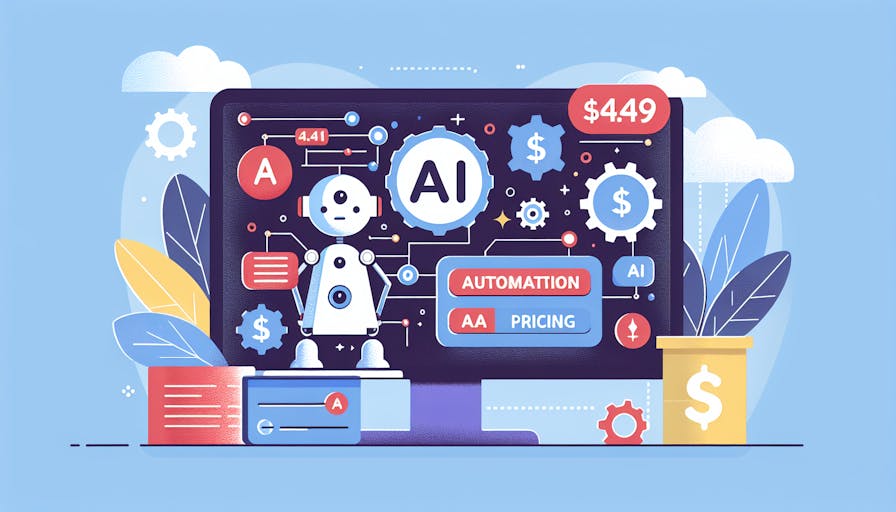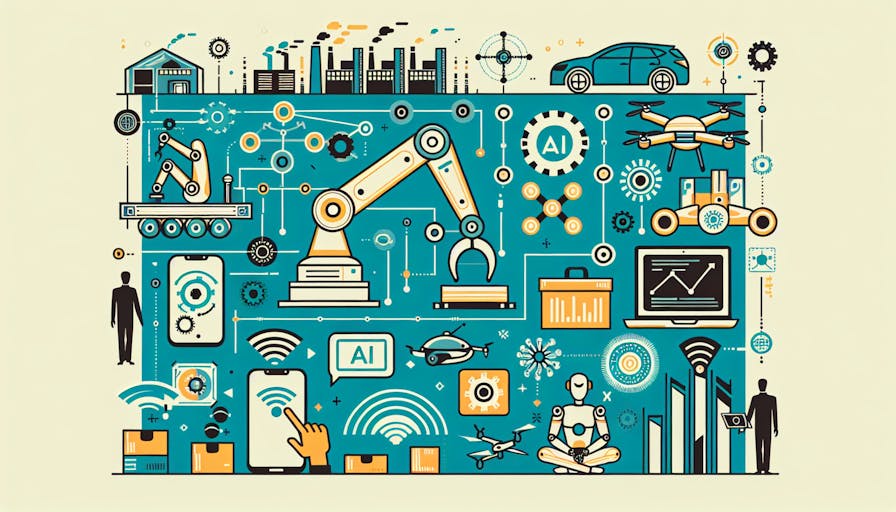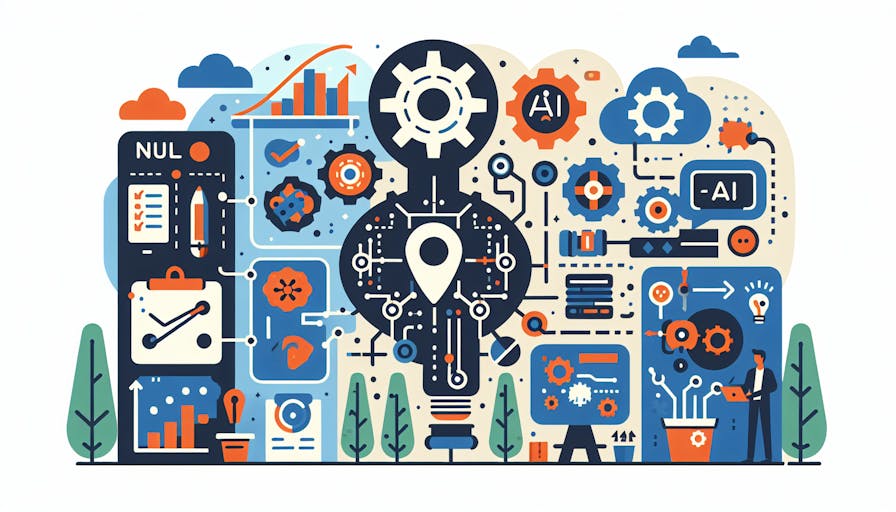AI agents are systems designed to perform tasks on behalf of users or organizations.
Understanding AI Agents
What are AI Agents?
AI agents are systems designed to perform tasks on behalf of users or organizations. They are equipped with algorithms that enable them to analyze data, make decisions, and execute actions to achieve specific objectives. Essentially, these agents mimic human-like reasoning and behavior, allowing for automation in various fields.
AI agents can be standalone systems or integrated within larger frameworks. They operate using a combination of artificial intelligence, machine learning, and data analytics, enabling them to learn from experiences and improve their performance over time. I find it fascinating how these agents can continuously refine their capabilities based on the input they receive.
Here is a table summarizing the key characteristics of AI agents:
| Feature | Description |
|---|---|
| Autonomy | They can operate independently and make decisions. |
| Adaptability | Ability to learn and adjust to new information. |
| Communication | Enable interaction with users or other systems. |
| Task Performance | Can perform specific functions or workflows. |
The Role of AI Agents in Automation
AI agents play a crucial role in enhancing automation across various industries. By automating repetitive tasks, they free up valuable time for employees to focus on higher-level decision-making and creativity. The benefits of AI automation are numerous, including improved efficiency, reduced operational costs, and enhanced productivity.
In many organizations, AI agents are utilized to handle customer service inquiries, perform data analysis, and even conduct predictive maintenance. As an AI enthusiast, I appreciate how these agents streamline processes and help businesses optimize their operations.
The following benefits demonstrate the impact of AI agents in automation:
| Benefit | Description |
|---|---|
| Increased Efficiency | Automating routine tasks leads to faster outcomes. |
| Enhanced Decision Making | Data-driven insights support better choices. |
| Cost Reduction | Minimizes the need for manual intervention. |
| Scalability | Adjusts easily to accommodate growth or demand. |
AI agents signify a transformative shift in how organizations operate, helping to bridge the gap between technology and human resources. I believe this trend will continue to grow, influencing how various sectors adapt and evolve in the future. For more insights into this topic, consider exploring our article on ai automation trends or the ai automation implementation process.
Working of AI Agents
Understanding how AI agents work is essential for grasping their capabilities and potential impact.
Data Collection and Processing
One of the first steps in the functioning of AI agents involves gathering data from various sources. This data can come from user interactions, social media, databases, and more. The collected data is then processed to ensure it is organized and relevant for analysis.
The processing phase often includes filtering, cleaning, and transforming the data into a usable format. This prepares the data for subsequent phases where machine learning algorithms will be applied.
| Data Source | Description |
|---|---|
| User Interactions | Input from users through queries or commands |
| Social Media | Real-time data from posts and trends |
| Databases | Structured information stored in systems |
| IoT Devices | Continuous data from sensors and devices |
Machine Learning Algorithms
Once the data is ready, machine learning algorithms come into play. These algorithms enable the AI agents to learn from the data and identify patterns or trends. The learning process is crucial for the agent to improve over time.
There are several types of machine learning approaches used by AI agents:
- Supervised Learning: The agent is trained on labeled data, allowing it to predict outcomes based on input data.
- Unsupervised Learning: The agent analyzes unstructured data to find hidden patterns without prior labels.
- Reinforcement Learning: The agent learns by receiving rewards or penalties based on its actions in an environment.
The choice of algorithm depends on the specific task the AI agent is designed to perform. These algorithms can adapt as they receive more data, leading to improved accuracy and efficiency.
Decision-Making and Execution
After processing data and training on relevant machine learning algorithms, AI agents move to the decision-making phase. They evaluate the options available based on the data they have processed and choose the best course of action.
This decision-making process can be influenced by various factors, including:
- Objectives: The goals set for the AI agent, such as improving customer satisfaction or optimizing resource allocation.
- Constraints: Limitations that the agent must operate within, such as budget or regulatory requirements.
Once a decision is made, the AI agent executes the action, which can involve automating a task, providing an answer to a user, or triggering another process.
The operational efficiency gained through this process reflects some of the key benefits of AI automation that I appreciate within various applications. For a deeper dive into how AI agencies implement these agents, consider exploring our articles on ai automation agency services and ai automation implementation process.
Benefits of AI Agents
AI agents bring a host of advantages to organizations and individuals looking to enhance operations. As I explore the benefits of AI automation, I highlight key aspects that make these systems valuable.
Increased Efficiency
AI agents can significantly streamline processes that used to require human intervention. By automating repetitive tasks, they reduce the time and effort needed to accomplish work. This increased efficiency often leads to faster project completion and lower operational costs.
| Task Type | Time Reduction (%) | Cost Savings (%) |
|---|---|---|
| Data Entry | 60 | 30 |
| Customer Support | 50 | 25 |
| Report Generation | 70 | 35 |
The integration of AI solutions allows me to reallocate resources to more complex projects, improving overall productivity.
Enhanced Decision Making
AI agents leverage vast amounts of data to assist in decision-making processes. Through advanced analytics and machine learning algorithms, they uncover patterns and insights that may not be immediately apparent to human analysts. This data-driven approach allows for more informed and timely decisions.
For example, in environments where quick adjustments are necessary, AI agents can assess various factors and provide actionable recommendations:
| Decision-Making Area | Improvement (%) |
|---|---|
| Risk Assessment | 40 |
| Market Analysis | 30 |
| Performance Forecasting | 50 |
These enhancements lead to better outcomes and a competitive advantage in various fields.
Scalability and Adaptability
One of the most significant benefits of AI agents is their ability to scale operations quickly. As demand fluctuates, these systems can ramp up or down without the need for extensive retraining or hiring processes. This adaptability means I can efficiently manage resources in response to changing market conditions.
| Scale Factor | Response Time (hrs) | Efficiency Gain (%) |
|---|---|---|
| Low Demand | 2 | 20 |
| Moderate Demand | 1 | 30 |
| High Demand | 0.5 | 50 |
By utilizing AI agents, I can effortlessly adjust to the evolving landscape, ensuring that my operations remain agile and responsive.
In summary, the benefits of AI automation are clear. From increased efficiency to enhanced decision-making and the scalability of operations, AI agents represent a powerful tool in advancing workflows. To learn more about the specific services and pricing offered by AI automation agencies, check out our articles on ai automation agency services and ai automation agency pricing. Additionally, staying informed on ai automation trends will keep me ahead in the ever-evolving field of AI.
Applications of AI Agents
AI agents are transforming various industries through their ability to automate processes and enhance user experiences. My exploration of their applications reveals how they can streamline operations and improve outcomes in specific areas.
Customer Service
In customer service, AI agents can provide support 24/7, resolving inquiries and assisting users without human intervention. This significantly reduces wait times and improves customer satisfaction. AI agents can utilize natural language processing (NLP) to understand and respond to customer queries effectively.
| Feature | Traditional Customer Service | AI Agent Customer Service |
|---|---|---|
| Availability | Limited hours | 24/7 |
| Response time | Often delayed | Instant |
| Volume of inquiries handled | Limited capacity | High capacity |
AI agents also learn from interactions, allowing them to improve responses over time. This aligns with my interest in realizing the benefits of ai automation within customer service operations.
Data Analysis
AI agents excel in data analysis by quickly processing vast amounts of information and identifying patterns that would take humans much longer to discern. They can automate data cleaning, modeling, and visualization tasks, making insights more accessible.
| Task | Manual Analysis | AI Agent Analysis |
|---|---|---|
| Time to analyze data | Days to weeks | Minutes to hours |
| Accuracy | Prone to human error | Higher accuracy |
| Scalability | Limited by manpower | Scalable across datasets |
This ability to analyze large datasets efficiently supports businesses' decision-making, further emphasizing the value of ai automation trends in today’s data-driven landscape.
Predictive Maintenance
In industries such as manufacturing and transportation, AI agents play a crucial role in predictive maintenance. They analyze data from machinery and equipment to predict failures before they occur. This proactive approach minimizes downtime and reduces maintenance costs.
| Metric | Traditional Maintenance | Predictive Maintenance |
|---|---|---|
| Maintenance schedule | Fixed intervals | Condition-based |
| Unexpected failures | Common | Reduced occurrences |
| Cost implications | Higher costs due to downtime | Lower maintenance costs |
By utilizing predictive maintenance, companies can enhance operational efficiency, aligning with my view on the substantial implications of ai automation implementation process in these sectors.
Each of these applications illustrates the transformative power of AI agents across various fields, reaffirming my belief in their potential to revolutionize how we operate and make decisions.
Challenges in AI Agent Implementation
Implementing AI agents is not without its hurdles. While the benefits of AI automation are significant, I have encountered several challenges that require thoughtful consideration.
Data Privacy and Security
One of the foremost concerns regarding AI agents is data privacy and security. As AI systems often process vast amounts of sensitive data, ensuring this information remains secure is critical. Breaches can lead to significant consequences for both individuals and organizations.
The table below outlines key considerations for maintaining data privacy:
| Consideration | Description |
|---|---|
| Data Encryption | Protects data by converting it into a secure format |
| Access Control | Limits who can view or manipulate sensitive information |
| Compliance | Adhering to regulations such as GDPR or HIPAA |
For more insights on privacy measures, check out our article on AI automation agency services.
Ethical Considerations
Ethics plays a pivotal role in AI agent implementation. The decisions made by AI systems can have life-altering consequences. It is my responsibility to ensure that these systems are designed to avoid bias, promote fairness, and uphold transparency.
Key ethical considerations include:
| Ethical Factor | Importance |
|---|---|
| Bias | Ensures that AI does not perpetuate existing inequalities |
| Accountability | Establishes who is responsible for AI-driven decisions |
| Transparency | Promotes understanding of how decisions are made |
For more information on ethical practices, consider exploring our insights on AI automation trends.
Integration with Existing Systems
Integrating AI agents with current systems poses another challenge. Existing infrastructure may require updates to accommodate AI technologies. The complexity of this process can vary greatly based on organizational size and technology already in use.
Factors affecting integration include:
| Factor | Description |
|---|---|
| Compatibility | Ensuring AI systems can function with legacy software |
| Training | Providing necessary skills to employees for new systems |
| Transition Period | Time needed to fully integrate and adjust to changes |
For details on the integration process, check out the article on AI automation implementation process.
By recognizing and addressing these challenges, I can better navigate the potential pitfalls of AI agent implementation while maximizing the benefits of AI automation in my endeavors.
The Future of AI Agents
The future of AI agents promises remarkable advancements and an expansion of capabilities that can shape various industries. In this section, I will explore the evolving technologies, the broader applications on the horizon, and the potential impact on society.
Evolving Technologies
Developments in technology are propelling AI agents to new heights. Innovations such as natural language processing, computer vision, and enhanced machine learning algorithms are creating smarter AI agents capable of performing complex tasks. These advancements allow AI agents to better understand human interactions, recognize patterns in data, and adapt to dynamic environments.
| Technology | Description | Potential Applications |
|---|---|---|
| Natural Language Processing | Enables understanding and generation of human language | Customer support, virtual assistants |
| Computer Vision | Allows recognition and interpretation of visual information | Surveillance, quality control |
| Reinforcement Learning | Trains agents to make decisions through trial and error | Robotics, game playing |
Expansion of AI Applications
As I observe the ongoing growth in AI automation, I see an increasing trend toward diversified applications. AI agents are becoming integral in various sectors, including healthcare, finance, and manufacturing. Their capabilities range from improving operational efficiency to enhancing customer experiences.
Some emerging applications include:
| Sector | Current Use Cases | Future Prospects |
|---|---|---|
| Healthcare | Patient monitoring, diagnosis assistance | Personalized treatment plans, robotic surgeries |
| Finance | Fraud detection, algorithmic trading | Predictive analytics, risk assessment |
| Manufacturing | Predictive maintenance, inventory management | Fully automated factories, real-time quality control |
I expect to see continuous exploration and implementation of AI solutions that can further streamline processes and improve productivity across many fields. For more details on specific services, check out our article on ai automation agency services.
Impact on Society
The proliferation of AI agents will undoubtedly influence society in significant ways. There are potential benefits, such as increased productivity and enhanced quality of life, but also challenges that must be addressed.
Some key areas of impact include:
| Area | Potential Outcomes |
|---|---|
| Employment | Job displacement in certain sectors, new job creation in AI-related fields |
| Privacy | Increased need for data protection measures, ethical considerations regarding surveillance |
| Accessibility | Improved access to services for people with disabilities, language barriers |
As I reflect on these factors, it's clear that the integration of AI into everyday life requires careful consideration and management. The insights from the advancements in AI automation not only help individuals and organizations but also lead to a reimagining of how society operates. I anticipate that ongoing research and responsible implementation will be vital as we navigate this exciting future. For more insights into industry trends, visit our article on ai automation trends.




